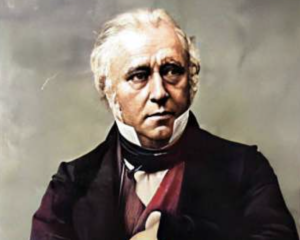0n February 4th, 1834, the young MP for Leeds made a farewell speech to his electors.
1834年2月4日,年轻的利兹市议员向选民发表了告别演讲。
Thomas Babington Macaulay, "Clever Tom", boy wonder at Cambridge, juvenile lead of the Whigs in the Commons, ace reviewer and historian in the making, had decided that as nice as all this was, he needed a fortune.
剑桥的青年才俊托马斯·巴宾顿·麦考莱,被称为"聪明的汤姆",是下议院辉格党的青年领袖,一流评论家和历史学家,虽然已是名声在外,他还想再发一笔财。
India, he'd been told, was where you got it, fast. And just to show that he wasn't a greedy Tom, while he was at it, he'd do good to the natives.
他听说在印度可以快速致富。为了表明他并非只为图财,他赚钱的同时也向当地人行善。
He might be leaving industrial Britain, but he was confident he'd find its products, as well as its benevolent spirit, alive and well in Calcutta.
他也许离开了工业化的英国,但他坚信会在加尔各答找到英国的产品,以及盛行于此的英国慈善精神。
May your manufactures flourish. May your trade be extended, may your riches increase.
祝你们的工厂兴旺发达。祝你们贸易繁荣,财源滚滚。
May the works of your skill and the signs of your prosperity meet me in the furthest regions of the east.
祝你们的成果和兴旺能飘洋过海,在最远的东方与我邂逅
Give me fresh cause to be proud of the intelligence, the industry and the spirit of my constituency.
请让我耳目一新,为智慧、工业和选民的信念而骄傲。
Macaulay's breezy optimism, that cotton cloth and constitutionalism were what Britain had to offer the world, was the authentic voice of the liberal empire.
麦考莱轻松乐观地相信,棉布和立宪制度将是英国对世界的最大贡献,他的乐观是这个自由帝国的真实声音。
Equally sure of itself, whether it was preaching and teaching, at India, Ireland or darkest England, where the natives also toiled in filth, ignorance and disease, and equally in need of a hefty dose of Victorian vim and vigour.
同样肯定的是在印度、爱尔兰或最黑暗的英国,无论是传道还是教书,因为当地人在污秽、愚昧与疾病中挣扎,维多利亚人必须付出大量的精力。

Asia, they thought, was especially inert, and the great principle of liberalism, according to its founders, was, above all, movement.
他们认为亚洲尤为迟缓,据自由主义的创始人说,他们最伟大的原则就是运动。
Macaulay had been brought up a strict Christian, but his real church was the church of progress -- steam engines, free newspapers, parliamentary government.
麦考莱是一位严谨的基督教徒,但他真正信仰的是发展--蒸汽机、免费报纸、议会政体。
The historian in him looked at the rise and fall of civilizations and was jubilant that this was Britain's time for imperial greatness.
作为历史学家,他目睹了人类文明的跌宕,为伟大的英帝国而喜悦。
We would share our blessings, moral and material. We would take ancient societies, miserable with poverty and tyranny, and teach them self-reliance.
我们分享祝福、道德准则与物质材料。我们会进入那些悲惨贫穷、被暴政统治的古老社会,教他们如何自给自足。
And when we'd done the job, we'd pack up and go home.
当我们完成任务后,就收拾行装回家。
So the great principle of the British Empire would be its own self-liquidation.
所以大英帝国最伟大的原则就是它可以自我清理。
It would be like a parent, full of bittersweet emotion as its children were sent off into the world, tied to the home no longer by power, but by grateful affection.
它就像一位心中五味杂陈的家长,它的孩子们被送到世界各地,虽然告别了家乡,但是因为感激与爱,仍然心系故土。



